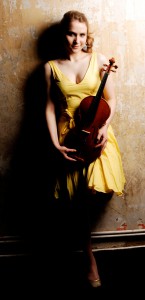“I want to do this for the rest of my life.”
The young British violist Rosalind Ventris is quickly emerging as one of the most promising artists of her generation. At 17, she was the youngest competitor at the 2006 Lionel Tertis International Viola Competition, where she won the prize for the most promising British entrant, and the EUCO prize. She made her London concerto debut the following year, performing Hindemith’s Viola Concerto “Der Schwanendreher”. Rosalind is currently based in London, giving concerts throughout the UK, and abroad. This month she visits The Netherlands with recitals in the Concertgebouw and in Den Hoorn (Texel), with works by Hindemith, Roxburgh and Bowen.
DVS: How did you get started on the viola?
I started learning the violin, and then took up the viola as well aged eight. I played both till I went up to Cambridge University to read Music and at that point only wanted to practise the viola! At the very beginning I played a violin strung as a viola, and then a small viola by the Scottish maker Thomas Hardie. After that I played a wonderful viola by Andreas Hudelmayer which is very light. Having taken up the viola at quite a young age, I was very lucky to have access to good instruments which didn’t cause me any serious physical strain.
DVS: What made you decide to become a professional violist?
When I started playing I knew I wanted to be a musician, and I went to a specialist music school- the Purcell School of Music- when I was ten. I have always loved the sound of the viola and its repertoire. That said – I went to many music courses when I was a teenager and I remember having a moment when I was playing the slow movement of Beethoven Op.59 No.2 on a course and thinking, ‘I want to do this for the rest of my life.’
DVS: Your favourite musical advice?
Wow, there have been so many! One of my favourites: ‘Practise with your brain, perform with your heart.’ David Takeno.
DVS: Most memorable viola moment?
Playing my first solo recital at the Wigmore Hall last October, it really is a magical hall.
DVS: How do you experience the difference between performing solo repertoire (Concertos, solo recitals) versus chamber music? Do you have a preference?
I don’t have a preference; I just love playing the viola! I’m amused that some people still don’t think of it as a solo instrument though. It’s sometimes said that the repertoire is ‘limited’, but there is great music written for the viola (and, of course, excellent arrangements). It’s just a matter of discovering this music, if you have the curiosity and want to.
You learn so much from playing with other people, both through things you talk about, and just playing together. When everyone gets along it’s really very fun too! I’ve learnt so much from rehearsing with Lara Dodds-Eden and my flute, viola, harp trio, Trio Anima. As a soloist with orchestra life is a little lonelier, but you’re still collaborating with a group which has its own sound which is very exciting. You have to have definite ideas about any music you play, but you have to be especially clear when playing a concerto. Playing a recital completely on your own is something has its own unique demands – for obvious reasons!
DVS: We almost forgot to ask about your viola…!
I’m very fortunate to be playing a wonderful brothers Amati viola, made in 1619, which has been leant to me for this tour. It has an absolutely gorgeous mellow chocolatey viola sound!
DVS: Musicians and composers from Great Britain spearheaded the renaissance of the viola in the late 19th / early 20th century, with great names such as Lionel Tertis, Frank Bridge, York Bowen, Rebecca Clarke, Britten, Vaughan Williams and many others. How is this heritage visible in British music institutions today, particularly for violists?
There’s a lot of British viola music played by composers like the ones you mention today, but it’s a shame that this repertoire is not more widely known within the UK. In my experience, it seems that even the Rebecca Clarke Sonata, which I’ve performed many times, is not really known by the general public. I think that all of the music colleges here have recently had a viola festival of some description and from what I’ve seen or heard of a good deal of early twentieth century repertoire is played at such events. We also have the Lionel Tertis International Viola Competition and Festival on the Isle of Man, which is one of the few international competitions exclusively for the violists.
DVS: How are classical musicians affected by the economic crisis in the UK?
I find recent comments from the government slightly worrying regarding things to come. I completely agree with what John Gilhooly said at the RPS music awards: ‘Making money never has, and never should be, the driving force for great art.’
DVS: What are your personal near term goals and prospects?
My goal is always to try and play with all the depth and sincerity I can. I’m playing in Aldeburgh at the end of next month, and very excited to be part of the celebrations of Britten’s centenary this year. I’m really looking forward to be taking part in the IMS Prussia Cove Tour later in the year too.
© Dutch Viola Society / edited by Kristofer G. Skaug

